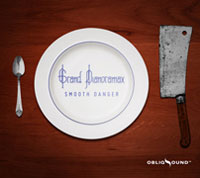Scott Morrow is ALARM’s music editor. Patrick Hajduch is a very important lawyer. Each week they debate the merits of a different album.
 Grand Pianoramax: Smooth Danger (ObliqSound, 5/3/11)
Grand Pianoramax: Smooth Danger (ObliqSound, 5/3/11)
Grand Pianoramax: “Roulette” (radio edit)
[audio:https://alarm-magazine.com/wp-content/uploads/2011/03/Grand_Pianoramax_Roulette_radio_edit.mp3|titles=Grand Pianoramax: “Roulette” (radio edit)]Morrow: Conceived as something of a live piano-and-drums experiment, Grand Pianoramax is the principal project of pianist Leo Tardin. Once “a New Yorker from Switzerland” and now “a Berliner from America,” Tardin uses a small arsenal of instruments — grand piano, Fender Rhodes, K-Station, harmonium, Phillichorda — to achieve a diversity of sounds for his duo’s spacey, funky, classically infused music.
Smooth Danger is the duo’s third and newest album; released overseas last fall, it sees a US release in a few months. Though it doesn’t depart much from its predecessors, it cuts back a bit on guest vocalists, allowing the duo’s music to better stand on its own. And it deserves to, thanks to its combination of killer melodies, synthesized grooves, and classical piano that overlay tight, rapid rock and boom-bap beats from new drummer Dominik Burkhalter. (The former drummers, by the way, were no slouches: Deantoni Parks [The Mars Volta, Meshell Ndegeocello] and Adam Deitch [Talib Kweli, John Scofield].)
Hajduch: There are moments, such as on “The Queen,” when the spastic nature of the instrumentation threatens to overwhelm the songcraft. But more often than not, the tics and hiccups of the music stay out of the way. Most tracks stick to a simple “bass groove + drum workout” formula that’s hard to beat. The vocal cuts are the weakest; they just don’t seem necessary, and Black Cracker and the eternally overrated Mike Ladd don’t really overwhelm with personality (though Ladd’s spoken-word piece is infinitely better than either of Black Cracker’s).
Some of the instrumentals sit on the outer-wonky end of the dubstep spectrum (think Slugabed), with the type of pitch/stutter tricks ascribed to fidget house. Others, like “Clairvoyance,” wouldn’t sound completely out of place on a prog album (think Yes’ “Five Per Cent For Nothing”) once the drums get going. There’s little on this album not to like; if anything, the vocal tracks could be jettisoned.
Morrow: For the most part, I agree about the vocal tracks, but to be fair, I haven’t heard much of Grand Pianoramax’s older guest spots, which include Mr. Lif (possibly my favorite rapper). And I like the Ladd track, but I worry that the first track with Black Cracker (“Sleepwalk”) might give listeners the wrong idea about the rest of the album.
As for the rest of the music, there also are moments of quasi-8-bit audio, such as the beginning to “Roulette” that sounds like the old Atari game Combat, and there are even tinges of cinematic drama, like the low, pounding piano notes of “Domestic Bliss,” a track that nicely fits the echoing words of Ladd. Karsh Kale also provides a few great tabla spots.
In all, I think that we were both pleasantly surprised by this, even if we’d change a few things.
[Have you pledged yet? Don’t forget to visit the Kickstarter page for Chromatic: The Crossroads of Color and Music, our next book that profiles independent musicians and artists who explore color in unorthodox ways.]

